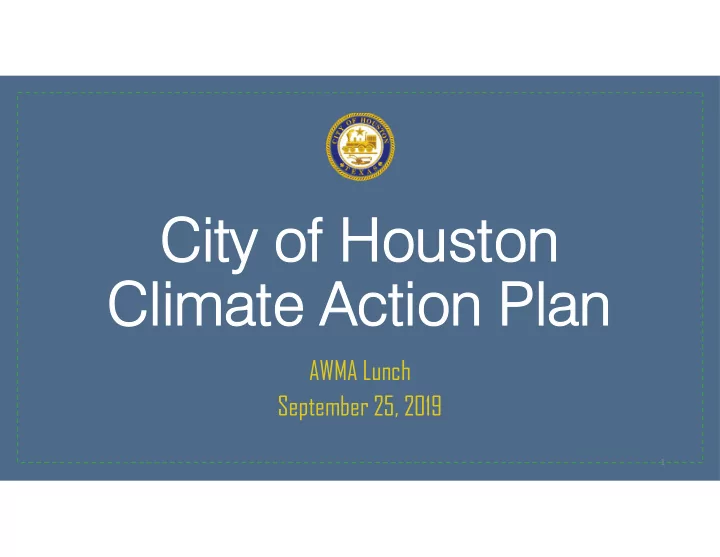

City of Houston Climate Action Plan AWMA Lunch September 25, 2019 1
Why Houston is taking Climate Action Hurricane Harvey Source: World Bank Group
Houston’s Commitment to Climate Action 427 Climate Mayors represent • June 1, 2017: nearly 20% of the U.S. population The U.S withdraws from the 2015 Paris Agreement • June 24, 2017: Mayor Turner, co-chair of Climate Mayors, commits to adopt Paris Agreement goals in Houston 3
What is a Climate Action Plan? 4
What is a Climate Action Plan (CAP)? The CAP will outline goals, strategies, and actions that we as a City and community plan to take in order to reduce our greenhouse gas emissions and help Houston prepare for a changing climate. Co-benefits: Increase and improve mobility Enhance resilience Improve air quality Improve community equity and Reduce energy costs quality of life Expand renewable energy usage Regional economic growth 5
Goal: Carbon Neutral by 2050 To meet the Paris Agreement, this plan has set an ambitious goal of becoming Carbon Neutral by 2050, which means that we must reduce or offset any carbon dioxide that we release into the atmosphere. Houston’s Greenhouse Gas (GHG) Emissions Baseline (2014) 49% 47% 4% 6
A Data and Stakeholder-Driven Process 3 2 1 Stakeholders evaluate and Data is analyzed by Data measurement is propose sector to better 6 completed on potential understand city- current emissions actions for wide footprint likelihood of adoption, City and Community accessibility, take measures to and local support science-based impact targets Outputs & recommendations 5 are summarized in policy brief 4 Data is input into the C40 Pathways tool to drive scenario 7 planning and action steps
Strategic Areas of the Houston CAP 2 1 2 ENERGY TRANSPORTATION TRANSITION 4 3 MATERIALS BUILDING MANAGEMENT OPTIMIZATION EQUITY 8
Stakeholder Engagement and Dialogue • +30 stakeholder meetings • 25 working group meetings • 150+ individual discussions with private sector stakeholders and subject matter experts 9
Complementary Initiatives CROSS-CUTTING TRANSPORTATION BUILDING OPTIMIZATION • Climate Mayors • • Active Living Plan City Energy Efficiency Policy • • • Green Building Bayou Greenways 2020 Green Building Advisory Council • • Complete Communities Houston Green Office Challenge Resource Center • • Houston Bike Plan Residential Energy Efficiency • Hire Houston Youth • Houston ConnectSmart (TxDOT) Program • Our Great Region • • EVolve Houston Regional Water Plan • • (H-GAC) Green Fleet Study TX-PACE • • Plan Houston Livable Centers (H-GAC) • METRONext (METRO) • Resilient Houston ENERGY TRANSITION • Vision Zero • Smart Cities • Baker Institute and Mitchell • Walkable Places Committee Foundation CCUS Initiative • Green Power Program MATERIALS MANAGEMENT • Houston Parks Board • Long Range Solid Waste Plan • Solarize Houston • TREES Program • 50-for-50 initiative 10
Projecting Baseline and Target Emissions For 2030, 2040, 2050 milestones: [NO ACTION] • Set emission reduction goals of 40%, 75%, and 100%, respectively • Project emissions with no action and model emission reduction potential of actions *Baseline= Measured 11
DRAFT Goals and Strategies 12
Transportation Strategies: Goals: T1.1 Increase infrastructure and incentives for EV and alternative Shift regional fleet to EV and T1 renewable fuels alternative renewable fuels. T1.2 Convert 100% of the non-emergency, light-duty municipal fleet (cars and trucks) to EV technologies by 2030 T2.1 Implement integrated multi-modal transportation systems Reduce vehicle miles T2 traveled (VMT) per capita T2.2 Build and retrofit complete, transit-oriented neighborhoods T2.3 Implement traffic demand reduction programs T3 T3.1 Reduce the costs of early adoption of transportation Provide equitable mobility. technologies and services for vulnerable populations T3.2 Improve interconnectedness and safety of pedestrian and transit networks 13
Energy Transition Strategies: Goals: E1.1 Support installation of rooftop and community solar Increase local solar generation E1 E1.2 Advance investment and workforce development in and storage. renewable energy across business, financial, and transportation sectors E2.1 Promote the purchase of retail renewable power by Increase renewable energy E2 residents and businesses generated outside the city limits. E2.2 Advocate for renewable energy policies at the state and federal levels Invest in green infrastructure and E3 E3.1 Utilize Houston’s abundant greenspace to capture and carbon capture technology to store carbon offset emissions. E3.2 Offset municipal emissions (e.g. Fleet) E3.3 Promote Carbon Capture, Utilization, and Sequestration (CCUS) from industrial processes 14
Building Optimization Strategies: Goals: B1.1 Update energy code and increase compliance Reduce energy use from B1 buildings and maximize savings. B1.2 Develop programs that improve building energy efficiency Expand investment in energy B1.3 Reduce DWO and WWTP energy consumption B2 efficiency. 10% through optimization of facility operations and water conservation Optimize building operations B2.1 Promote clean energy financing programs B3 through investing in skilled local B2.2 Expand utility energy efficiency programs jobs. B3.1 Provide training in the operation, management and maintenance of relevant building systems . 15
Materials Management Strategies: Goals: M1.1 Engage public on waste reduction solutions Improve public awareness of M1 M1.2 Develop, implement, and promote sustainable municipal sustainable material consumption procurement strategies and disposal choices. M1.3 Promote upstream solutions to reduce/manage disaster debris systems M2 Reduce tonnage of landfilled waste. M2.1 Expand and innovate recycling opportunities to all Houston residents and businesses M2.2 Strengthen and support efforts to reduce food waste and create infrastructure for food organics collection and composting Protect public health and the M3 M2.3 Support and expand market development and diversion environment through optimized infrastructure solid waste operations and M3.1 Improve efficiency of all landfill, transfer stations and waste management. transportation M3.2 Ensure long-term disposable capacity and solid waste infrastructure 16
Next Steps 17
Public Feedback Request http://www.greenhoustontx.gov/climateactionplan/index.html 1. Provide Feedback on Draft Recommendations Deadline: September 30, 2019 2. Continue to share stories, resources, and photos of Climate Champions to feature in the CAP 3. Draft CAP Released for Public Comment ETA: Late 2019 18
Questions? Contact Information: Lara Cottingham Chief Sustainability Officer Lara.Cottingham@houstontx.gov 832-393-8503 Thank you! Learn more: http:/bit.ly/Houston-CAP 19
Recommend
More recommend